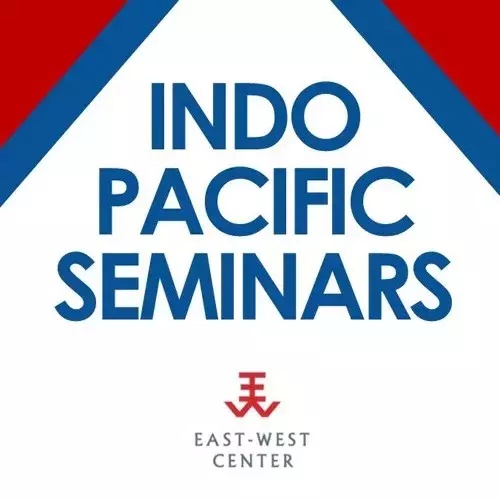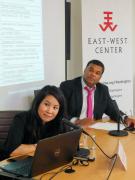Error message

OFFICE/DEPARTMENT
Sub-Regional Rivalry, Institutional Poaching & Parallel Governance Along the Mekong: From Liberal to Revisionist Institutionalism
An Indo-Pacific Political Economy and Trade Seminar featuring:
Dr. Pon Souvannaseng
Post-Doctoral Research Associate,
Global Development Institute, University of Manchester
Dr. Satu P. Limaye (Moderator)
Vice President, East-West Center & Director, East West Center in Washington
The Mekong ‘sub-region’ faces no shortage of overlapping and parallel transboundary governance institutions originating from within and outside the community of six states (Cambodia, Vietnam, Laos, Thailand, Myanmar, and China) through which

the mighty river runs. Despite the plethora of multilateral cooperative bodies and associations, transboundary water governance challenges and mainstream hydropower development continue to run rampant. This presentation examines how and why liberal institution building during and since the Cold War by actors such as the Asian Development Bank (ADB), the US, and Japan in the Mekong has given way to the establishment of alternative parallel governance institutions by non-OECD actors such as the recent Sino-sponsored 2016 Lancang Mekong Cooperation Mechanism (LMCM). Based on over two years of in-depth fieldwork and over a decade of engagement with Mekong politics, the presentation traces how intra-regional, international rivalry, and national development aspirations combine to form a significant shift in norms of governance in the region away from traditional liberalism in its OECD variant.
Dr. Pon Souvannaseng drew on the perspectives of the least developed country governments of the bloc to shed light on the politics and dynamics of ‘institutional poaching’ and revisionist institutionalism at work in the Mekong. In light of the tenth anniversary of the US-sponsored Lower Mekong Initiative (LMI) and the deepening expansion of Belt and Road partnerships and projects in Mekong states such as Myanmar, Laos and Thailand, this talk highlighted critical junctures in building pro-poor and environmentally just institutional cooperation along the Mekong.
For more images, please visit the album for this event on the East-West Center's Flickr page.
Dr. Pon Souvannaseng is a Post-Doctoral Research Associate at the University of Manchester’s Global Development Institute. Her research interests include aid politics and development finance; the political economy of energy security and infrastructure expansion, particularly in Southeast Asia; and issues of environmental governance and regulation. She has conducted extensive hydro-energy research in Mekong Southeast Asia and Africa. She leads research on Mapping Infrastructure Finance in Myanmar and Ghana as part of the UKRI-funded FutureDAMS research consortia. She has been a Fulbright Research Scholar in Southeast Asia and a CODESRIA-CLACSO-APISA South-South Young Laureate Award holder. She has previously served as a Fellow in Political Economy and International Development at University College London (UCL) and as a Research Analyst at the United Nations Research Institute for Social Development (UNRISD). She holds degrees from the London School of Economics and Tufts University in Political Science.
Satu Limaye is Vice President of the East-West Center and the Director of the East-West Center in Washington where he created and now directs the Asia Matters for America initiative and edits the Asia Pacific Bulletin. He is also a Senior Advisor at CNA Corp (Center for Naval Analyses) and Senior Fellow on Asia History and Policy at the Foreign Policy Institute at Paul H. Nitze School of International Studies (SAIS). He is a magna cum laude and Phi Beta Kappa graduate of Georgetown University and received his doctorate from Oxford University (Magdalen College) where he was a George C. Marshall Scholar. Dr. Limaye publishes and presents on a range of Indo-Pacific issues. Recent publications include: Raging Waters: China, India, Bangladesh and Brahmaputra River Politics (with Nilanthi Samaranayake and Joel Wuthnow); Why ASEAN is Here to Stay and What that Means for the US; The United States-Japan Alliance and Southeast Asia: Meeting Regional Demands; and Weighted West: The Indian Navy’s New Maritime Strategy, Capabilities, and Diplomacy.
Sub-Regional Rivalry, Institutional Poaching & Parallel Governance Along the Mekong: From Liberal to Revisionist Institutionalism
An Indo-Pacific Political Economy and Trade Seminar featuring:
Dr. Pon Souvannaseng
Post-Doctoral Research Associate,
Global Development Institute, University of Manchester
Dr. Satu P. Limaye (Moderator)
Vice President, East-West Center & Director, East West Center in Washington
The Mekong ‘sub-region’ faces no shortage of overlapping and parallel transboundary governance institutions originating from within and outside the community of six states (Cambodia, Vietnam, Laos, Thailand, Myanmar, and China) through which

the mighty river runs. Despite the plethora of multilateral cooperative bodies and associations, transboundary water governance challenges and mainstream hydropower development continue to run rampant. This presentation examines how and why liberal institution building during and since the Cold War by actors such as the Asian Development Bank (ADB), the US, and Japan in the Mekong has given way to the establishment of alternative parallel governance institutions by non-OECD actors such as the recent Sino-sponsored 2016 Lancang Mekong Cooperation Mechanism (LMCM). Based on over two years of in-depth fieldwork and over a decade of engagement with Mekong politics, the presentation traces how intra-regional, international rivalry, and national development aspirations combine to form a significant shift in norms of governance in the region away from traditional liberalism in its OECD variant.
Dr. Pon Souvannaseng drew on the perspectives of the least developed country governments of the bloc to shed light on the politics and dynamics of ‘institutional poaching’ and revisionist institutionalism at work in the Mekong. In light of the tenth anniversary of the US-sponsored Lower Mekong Initiative (LMI) and the deepening expansion of Belt and Road partnerships and projects in Mekong states such as Myanmar, Laos and Thailand, this talk highlighted critical junctures in building pro-poor and environmentally just institutional cooperation along the Mekong.
For more images, please visit the album for this event on the East-West Center's Flickr page.
Dr. Pon Souvannaseng is a Post-Doctoral Research Associate at the University of Manchester’s Global Development Institute. Her research interests include aid politics and development finance; the political economy of energy security and infrastructure expansion, particularly in Southeast Asia; and issues of environmental governance and regulation. She has conducted extensive hydro-energy research in Mekong Southeast Asia and Africa. She leads research on Mapping Infrastructure Finance in Myanmar and Ghana as part of the UKRI-funded FutureDAMS research consortia. She has been a Fulbright Research Scholar in Southeast Asia and a CODESRIA-CLACSO-APISA South-South Young Laureate Award holder. She has previously served as a Fellow in Political Economy and International Development at University College London (UCL) and as a Research Analyst at the United Nations Research Institute for Social Development (UNRISD). She holds degrees from the London School of Economics and Tufts University in Political Science.
Satu Limaye is Vice President of the East-West Center and the Director of the East-West Center in Washington where he created and now directs the Asia Matters for America initiative and edits the Asia Pacific Bulletin. He is also a Senior Advisor at CNA Corp (Center for Naval Analyses) and Senior Fellow on Asia History and Policy at the Foreign Policy Institute at Paul H. Nitze School of International Studies (SAIS). He is a magna cum laude and Phi Beta Kappa graduate of Georgetown University and received his doctorate from Oxford University (Magdalen College) where he was a George C. Marshall Scholar. Dr. Limaye publishes and presents on a range of Indo-Pacific issues. Recent publications include: Raging Waters: China, India, Bangladesh and Brahmaputra River Politics (with Nilanthi Samaranayake and Joel Wuthnow); Why ASEAN is Here to Stay and What that Means for the US; The United States-Japan Alliance and Southeast Asia: Meeting Regional Demands; and Weighted West: The Indian Navy’s New Maritime Strategy, Capabilities, and Diplomacy.









